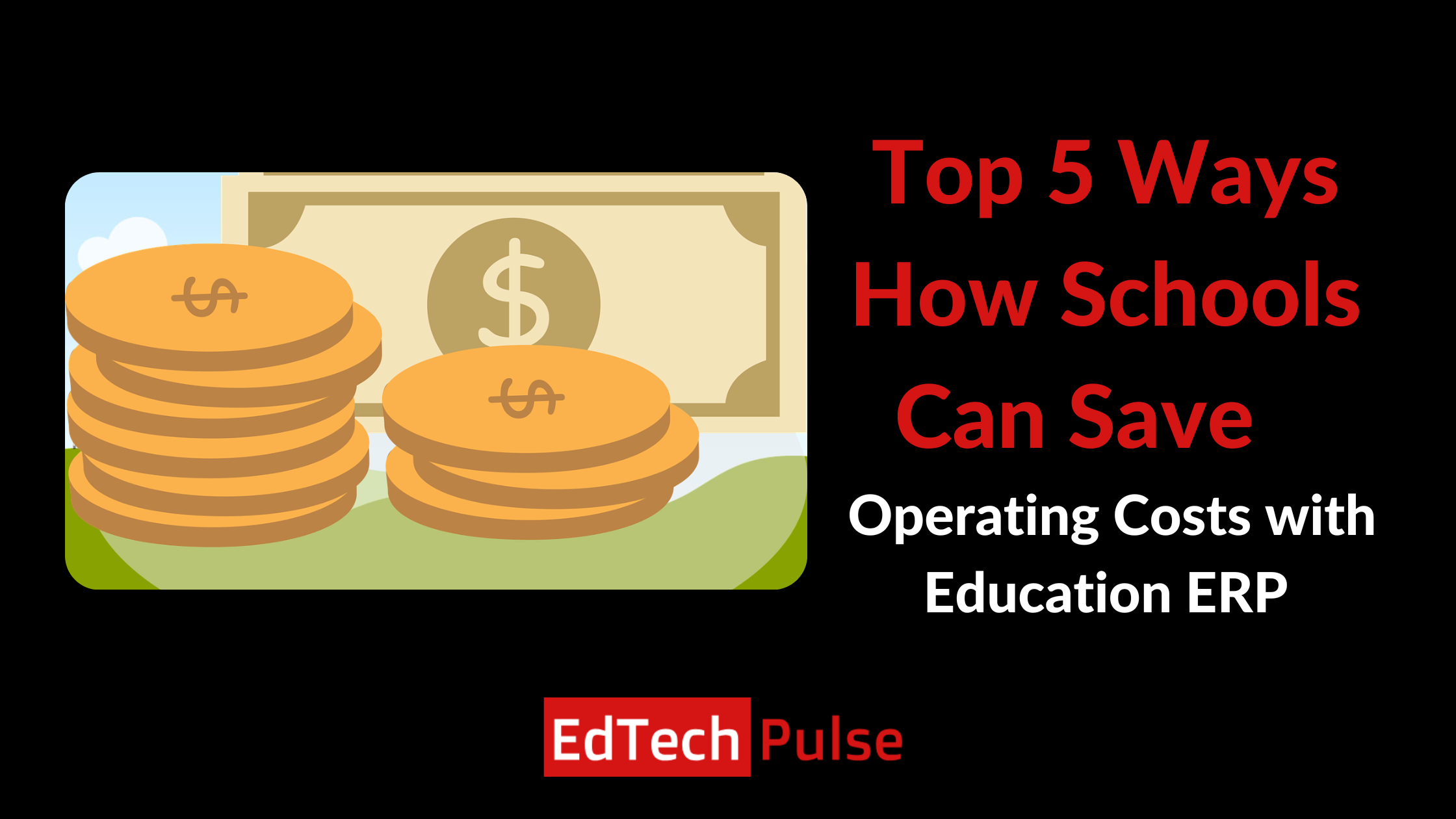Top 5 Ways How Schools Can Save Operating Costs with Education ERP
Schools serve the function of educating the next generation of our society. They need to run smoothly, give pupils access to the necessities, and pay their teachers' wages. And undoubtedly, a school would have to close if adequate funding was not provided for each of these activities.
Tuition revenue enables them to provide better facilities for students and make timely employee payments. However, administrators use traditional tactics to promote their institutions on occasion which are time-consuming and ineffective. Fortunately, there is one approach that schools can take to win over parents and children without jeopardizing their ability to make ends meet. ERP. Wondering how? Keep reading.
This blog will discuss what’s ERP and tell you how it can help your school save operating costs.
ERP Suites for Education: What Are They?
K-12 schools, colleges, and universities use integrated modules in education ERP (Enterprise Resource Planning) packages to manage their business operations. Education ERP suites, like ERP systems for large firms, efficiently connect educational institutions' "back office" divisions, such as finance and accounting, human resources, and fee payments.
By combining multiple tasks into a single integrated system, educational institutions' daily operations are streamlined, data silos are broken down, and departmental communication is improved. Furthermore, automation features in education ERP suites reduce the manual labor required for routine operations, such as obtaining data from various systems used by different departments.
Top 5 Ways How ERP Can Save Operating Costs for Schools
ERP significantly reduces costs. Let's see in detail how the ERP system helps to reduce operational costs:
Reduces the Cost of Paper
Numerous types of academic and administrative data, including sensitive and confidential information, are available to schools, colleges, and universities. These include initial student data, admission information, financial information, admission records, medical information, and a wide range of other academic and administrative data. Previously, most files, paper documents, and other manual processes were used to store all this data and information. All of these procedures took a significant amount of time and money.
As a result, ERP helps to reduce wasteful paper costs while also making all data and information secure, accessible, and dependable. It eliminates unnecessary paperwork and keeps all information accessible to all parties involved, including parents, teachers, and higher-ups.
Streamline Daily Tasks
The faculty and students at the institution are responsible for various daily tasks. This category includes daily attendance, essential record-keeping, library management, and other responsibilities. An ERP system can quickly eliminate these operations' high costs, labor, and time. Every institution's function is automated, making the university or institution more convenient for everyone who uses it.
Less Financial Strain on Examination
Exams, like admissions, are an important time of year for any educational institution. Exams are always expensive for universities and colleges to make organized, functional, and efficient. Higher authorities constantly look for ways to reduce exam costs without jeopardizing internal processes.
Through automation, ERP software makes the examination process more straightforward, adaptable, and reliable while reducing wasteful spending and faculty workload. The primary goal of an education ERP is to simplify all academic and administrative responsibilities of universities, colleges, and institutions while lowering overall costs.
Data Security
An effective ERP system has multi-layer security mechanisms to prevent suspicious individuals from using sensitive student information for their purposes.
Compared to manually stored paper files on shelves, digitally stored files provide a higher level of security because they cannot be easily accessed. This also reduces the need to hire individuals to specially take care of such files.
The ERP system can securely store, retrieve, and manage mountains of data in seconds or minutes. Furthermore, it keeps a backup, so critical data is not lost if the system crashes.
Any educational institution must maintain effective communication, and they do so through
Eliminates the Cost of Additional Fee Payments
Payment of fees is frequently the most critical transaction for any educational institution. They necessitate focus, perception, honesty, and clarity, but mistakes, misunderstandings, and administrative turmoil can occur even when these qualities are present. An education ERP provides transparency, clarity, flexibility, and scalability for each fee transaction at each level.
There is no longer a need for a significant workforce to handle fee payments, and parents and students are alerted when the payment deadline is approaching. The administrator has more accessible access to all transactions for each student, making it simple to generate receipts for all transactions.
Consider These Education ERP Software Features
An education ERP system can only manage every aspect of your institution if adequately equipped. If you're looking for an ERP solution to help you manage your school, the platform must include the following features:
- User-friendly interface
- Email, SMS, and other notification systems
- Automatic attendance reporting
- A powerful tool for scheduling
- Easily accessed course materials
- Multiple invoicing and billing capabilities
- Integrations for managing student data
Conclusion
Hopefully, this blog has helped you understand a modern ERP and how it can save money and organize a facility's workflow.
ERPs for education is ideal for schools of all sizes. Using an ERP system will not only help your school run more smoothly, but it will also assist you in marketing your company to your target market. However, the ideal ERP system must provide the tools you require to make your life easier. And thus it’s best to compare and then make a wise choice.
